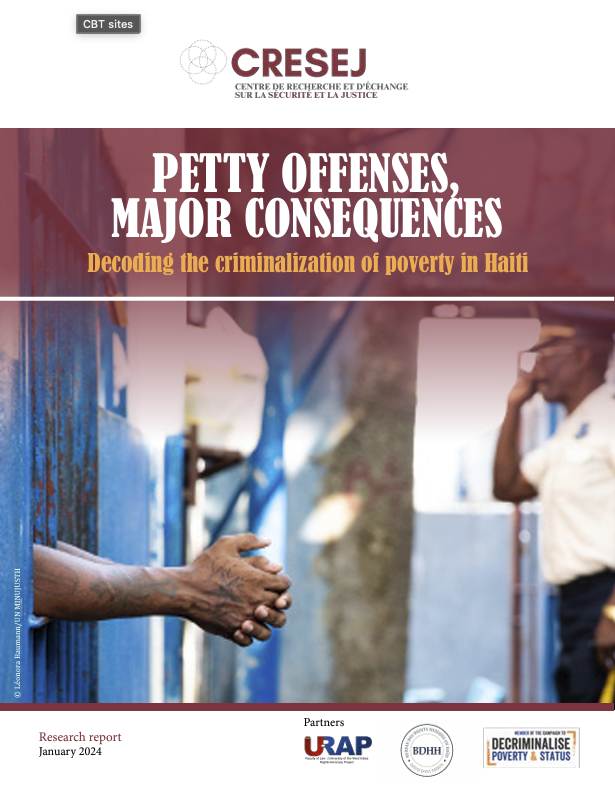This report presents the findings of an empirical investigation into criminalization of poverty in Haiti. The research, conducted by the Center for research and exchange on security and justice (CRESEJ) in collaboration with the Bureau of Human Rights in Haiti (BDHH), uses a mixed methodology (quantitative and qualitative), combining analysis of prison data and field surveys, to provide a precise portrait of the prevalence of minor offenses in the Haitian penal system. The findings reveal over-incarceration for minor offences, exacerbating social and economic inequalities by affecting mostly poor and vulnerable populations, with devastating impacts on individuals and their families. The report calls for judicial and legislative reform to address these inequities and recommends decriminalization of minor offenses in Haiti.
Petty Offenses, Major Consequences: Decoding the criminalization of poverty in Haiti

Year: 2024
Resource Type:
Report
Report
Themes:
Courts Systems
Human Rights
Petty Offences
Pre-trial Detention
Prisons
Courts Systems
Human Rights
Petty Offences
Pre-trial Detention
Prisons
Region:
Latin America & the Caribbean
Latin America & the Caribbean
Country(ies):
Haiti
Haiti
People Groups:
Black, Indigenous and People of Color (BIPOC)
Children & Young People
Elderly People
Informal Workers
LGBTQIA+ persons
Marginalised Ethnic Persons
People in Detention
People with Disabilities
People affected by Displacement (including migrants and refugees)
People who use Drugs
People facing Exclusion
People experiencing Homelessness or live in informal settlements
People experiencing Poverty
Protestors
Sex Workers
Women and Girls
Black, Indigenous and People of Color (BIPOC)
Children & Young People
Elderly People
Informal Workers
LGBTQIA+ persons
Marginalised Ethnic Persons
People in Detention
People with Disabilities
People affected by Displacement (including migrants and refugees)
People who use Drugs
People facing Exclusion
People experiencing Homelessness or live in informal settlements
People experiencing Poverty
Protestors
Sex Workers
Women and Girls
Approach:
Advocacy
Law Reform
Policy Reform
Research
Advocacy
Law Reform
Policy Reform
Research
Campaign Partner:
Centre de recherche et d’échange sur la sécurité et la justice (CRESEJ)
Rights Advocacy Project, Faculty of Law, University of West Indies
Centre de recherche et d’échange sur la sécurité et la justice (CRESEJ)
Rights Advocacy Project, Faculty of Law, University of West Indies
